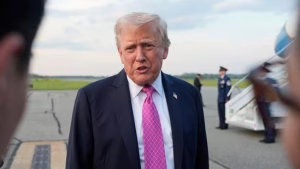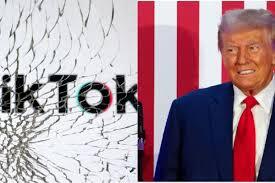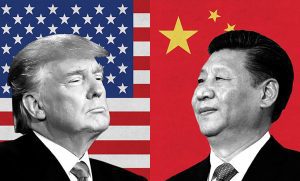Washington D.C. – The ongoing Trump TikTok China negotiations have reached a critical juncture as President Donald Trump declared he may allow the popular social media platform to “die” rather than extend the September 17 deadline for a fourth time. Speaking to reporters in New Jersey on Sunday, Trump indicated that the fate of TikTok now rests entirely on Beijing’s willingness to cooperate in resolving the complex ownership dispute.
The Trump TikTok China standoff has evolved into a high-stakes diplomatic and economic battle, with the President expressing uncertainty about whether he will grant another extension. “I may or may not. We are negotiating TikTok right now. We may let it die, or we may…I don’t know. It depends on China,” Trump stated, highlighting the precarious nature of the platform’s future in the United States.
Fourth Extension Deadline Looms

If the September 17 deadline passes without resolution, it would mark the fourth reprieve that the Trump administration has granted from federal enforcement of legislation originally requiring ByteDance to sell or shut down TikTok by January 2025. The Trump TikTok China negotiations have been characterized by repeated delays and extensions as both sides struggle to reach mutually acceptable terms.
The President previously extended deadlines from the original January date to early April, then from May to June, and subsequently to the current September timeline. Each extension in the Trump TikTok China saga has been accompanied by claims of progress and potential breakthrough deals that ultimately failed to materialize within the specified timeframes.
Last month, Trump indicated he had identified potential US buyers for the application and suggested he could extend the deadline further if necessary. However, his recent comments suggest growing frustration with the pace of negotiations and Beijing’s apparent reluctance to approve crucial aspects of any potential deal.
Youth Vote Considerations

Despite the hardline rhetoric, the Trump TikTok China decision carries significant political implications, particularly regarding younger voters who heavily utilize the platform. Trump acknowledged this demographic consideration, stating, “I would love to do it for the kids, they like it,” referencing TikTok’s popularity among American youth who helped support his 2024 presidential election victory.
The Trump TikTok China dilemma reflects broader tensions between national security concerns and political pragmatism. While China hawks in Washington have consistently warned that Beijing could potentially exploit TikTok to spy on, blackmail, or censor American users, Trump has previously expressed desire to preserve the application due to its role in reaching younger demographics.
This balancing act in the Trump TikTok China negotiations demonstrates the complex intersection of cybersecurity policy, electoral politics, and international relations that characterizes modern digital governance challenges.
Algorithm Approval Bottleneck


Progress in the Trump TikTok China discussions has been significantly hampered by disputes over TikTok’s proprietary algorithm, which forms the core of the platform’s addictive user experience. Any potential sharing of this valuable intellectual property with American buyers requires explicit approval from Beijing authorities, creating a substantial bottleneck in negotiations.
Also Read: India US Corn Trade: Lutnick’s Explosive Warning Threatens Relations
The Trump TikTok China impasse centers on this algorithm question, as Chinese officials have been reluctant to authorize the transfer of what they consider strategically important technology to foreign entities. This technological sovereignty issue has become a defining characteristic of broader US-China economic competition.
A comprehensive deal framework had been developed during spring negotiations that would have spun off TikTok’s US operations into an independent American-based firm, majority-owned and operated by US investors. However, this Trump TikTok China arrangement was suspended after Beijing indicated it would not provide necessary approvals following Trump’s announcements of steep tariffs on Chinese goods.
Diplomatic and Economic Consequences


The Trump TikTok China standoff reflects broader deterioration in bilateral relations between Washington and Beijing across multiple economic and technological sectors. The social media platform has become emblematic of larger questions about technology transfer, data security, and economic sovereignty in the digital age.
Chinese officials have viewed the forced sale requirement as economic coercion and technological theft, while American policymakers argue that national security concerns justify such measures. The Trump TikTok China negotiations have thus become a proxy battle for larger questions about technological decoupling between the world’s two largest economies.
Uncertain Future Ahead
With the September 17 deadline rapidly approaching, the Trump TikTok China situation remains highly fluid and unpredictable. Trump’s comments suggest he is prepared to allow the platform to cease US operations rather than continue indefinitely extending deadlines without concrete progress from Chinese authorities.
The ultimate resolution of the Trump TikTok China dispute will likely have far-reaching implications for future technology regulations, international business practices, and the broader trajectory of US-China relations. As negotiations continue behind closed doors, millions of American users await news about whether their preferred social media platform will survive the current political and diplomatic turbulence.

